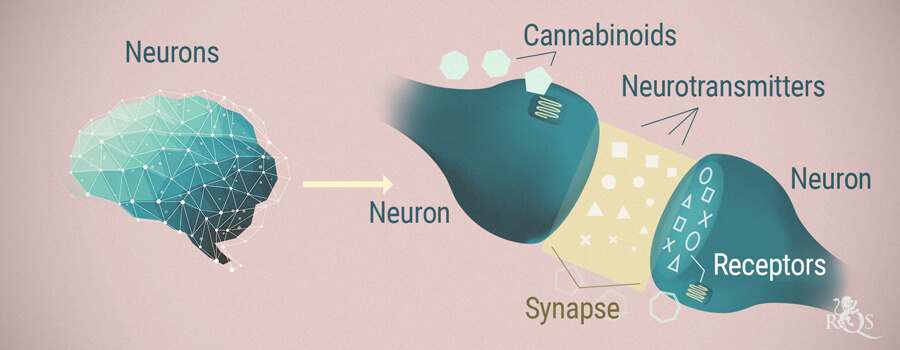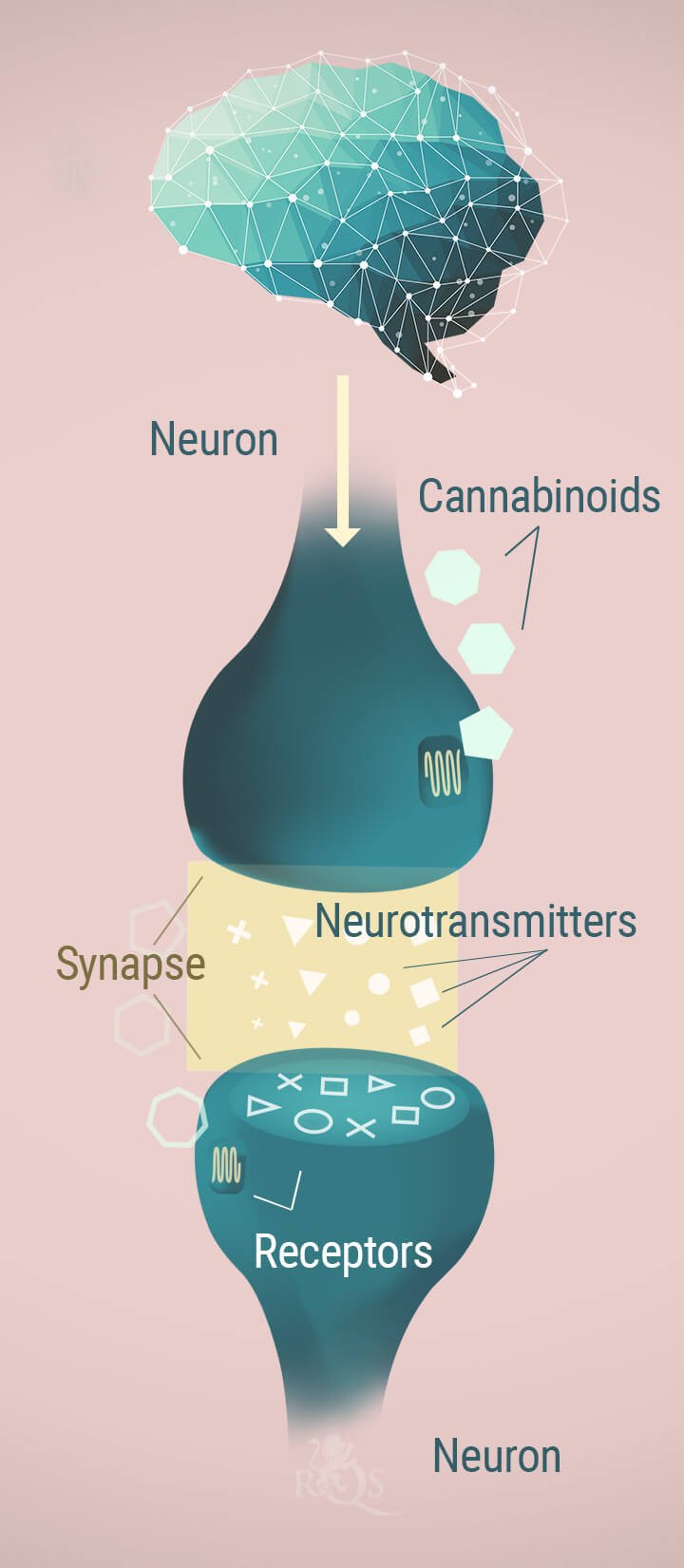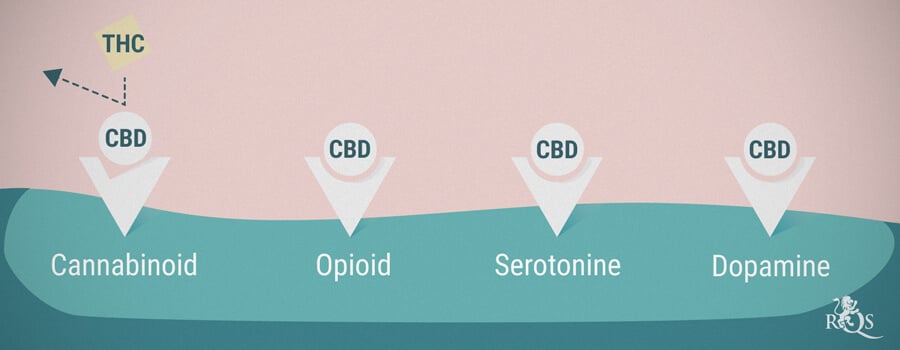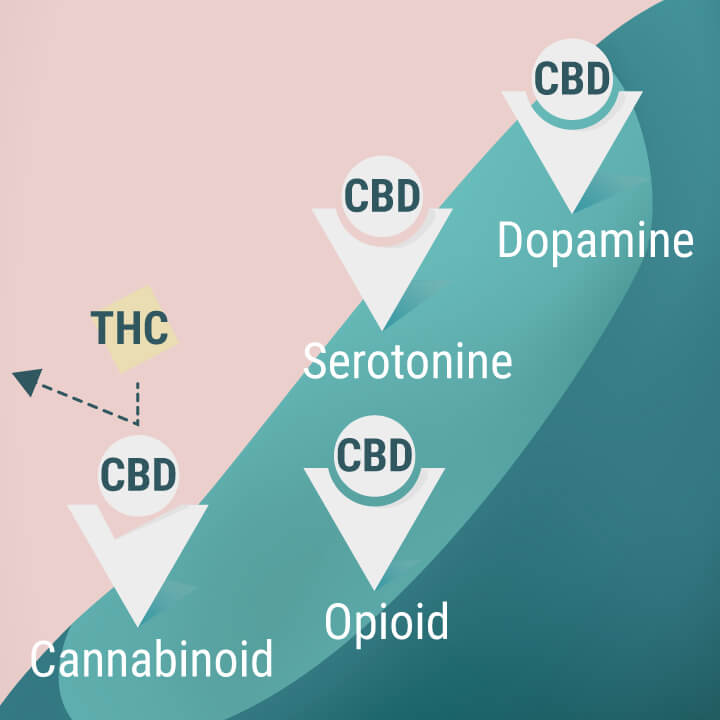.

CBD and Its Potential Impact on the Brain
Today, we explore the science behind cannabidiol and its potential effects on our brains. Is it true that CBD can benefit brain health? If so, how? Find out all you need to know below.
Contents:
As the hype behind medical cannabis continues to grow, the entire world is finally beginning to see many of its benefits to human health. And, amongst all of the body’s vital organs, it is the brain that interacts with cannabis the most.
The endocannabinoid system, for one, transcends through this region of the nervous system. And, once a cannabinoid like CBD enters the body, brain function is one of the first processes affected.
Numerous studies have already explored how cannabidiol affects brain function, most of which have shown promising results and spearheaded further research. But, how exactly does CBD impact the brain and its overall health? This article should explain everything you need to know.
How the Brain Works
The brain’s primary role is to process all of the information sent through the body, then send it back around. It’s like one central computer that controls memory, cognition, and experiences.
- The brain comprises three main sections: the cerebrum, cerebellum, and brain stem. The cerebrum is the largest section, located in the outer part. It is responsible for our ability to walk, think, learn new information, speak, feel, and read.
- The cerebrum has two main hemispheres: the left and the right. The former controls the right side of the body, while the latter controls the left.
Each hemisphere is then divided into four lobes, namely the temporal, frontal, occipital, and parietal. Each has specific functions that control reasoning, decision-making, personality, and sense of smell, among others.
At the back of the brain is the cerebellum, and its primary functions are mostly related to movement. It controls our ability to balance, fine muscle control (i.e. anything that involves hand-eye coordination), equilibrium, and posture maintenance.
Located at the bottom part of the brain is the brain stem. Its main purpose is to connect the cerebrum to the spinal cord. It also controls basic functions like breathing, blood pressure, and eye movement.


Cannabinoid Receptors in the Brain
Before we take a deeper dive into the cannabinoid receptors in our brains, it is important to first understand the endocannabinoid system. In a nutshell, it plays a modulatory role in achieving homeostasis (aka balance) within the brain and central nervous system.
That’s where the two major cannabinoid receptors come in: CB1 and CB2. Both of these receptor types are scattered throughout the body, but each is more concentrated in some areas than others.
Let’s first look at the CB1 receptors. An abundance of these are found in the nervous system, particularly in the brain, brainstem, and cerebellum. There are also CB1 receptors in the eyes, spleen, and the testis. Certain cannabinoids, such as THC, have a high binding affinity for CB1 receptors in the brain, giving rise to the psychotropic effects associated with marijuana.
As for CBD, it doesn’t bind with CB1 in a traditional way. Instead, it interacts with non-cannabinoid receptors[1] like TRPV1. TRPV1 receptors moderate the body’s response to inflammation and pain.
CB2 receptors, meanwhile, are located primarily within immune cells, and take on the role of modulating immune function. It’s through these receptors that the body can help fight inflammation.
Can CBD Improve Brain Function?
So, how exactly could CBD influence brain function? And, of what benefit might it be? Brain function is quite a broad term, and it covers a lot of ground. So, to help you understand it a lot easier, we’ll break everything down into the following categories.
-
CBD and Neurogenesis
Neurogenesis is a process by which the brain forms new neurons. Neurons, also known as nerve cells, are the ones in charge of receiving sensory information and sending commands to our muscles for movement. They are also responsible for the transformation and relaying of all electrical signals between each process.
But, how does CBD influence neurogenesis? According to several theories, cannabidiol holds the potential to increase neurogenesis by modulating the endocannabinoid system. In a 2010 study[2] performed on mice, it was found that a CBD-enriched diet aided in the survival of newborn neurons. In a 2018 study[3] performed on chronically stressed mice, CBD was found to increase neuronal differentiation, aka the process of cell development.
While more studies need to be done, experts agree that cannabidiol potentially has the ability to boost neurogenic activity.
-
CBD and Oxidative Stress
When your body produces more free radicals than antioxidants, that means you’re experiencing oxidative stress. Free radicals are molecules that take away electrons from other cells, which ultimately causes damage to the body.
Too much oxidative stress speeds up the ageing process, and may also lead to the development of long-term health issues like diabetes, heart disease, and cancer, among many others.
Research shows that CBD is perceived to play a role in reducing oxidative stress levels. According to findings in a 2008 study[4], cannabidiol has the potential to block endotoxins that induce oxidative stress.
Degenerative diseases like Alzheimer’s and Parkinson’s are also caused in part by oxidative stress. But, as recent findings suggest, CBD has the potential to provide relief for such conditions.
According to a 2011 study[5], cannabidiol was found to protect against oxidative damage brought on by amphetamine. And, given its anti-inflammatory potential, a 2007 study[6] found that CBD blunted neuroinflammation caused by Alzheimer’s.
-
CBD and Cerebral Blood Flow
Blood flow is an integral factor in optimal brain function and ageing. In human beings, average cerebral blood flow[7] is at 50ml of blood per 3.5 oz of brain tissue per minute. These values dip a little bit in white matter (20ml per 3.5 oz per minute) but increase in gray matter (80ml per 3.5 oz per minute)
Recent research has found a connection between cannabidiol and cerebral blood flow. A 2020 study[8] published in the Journal of Psychopharmacology showed CBD’s plausible capabilities of increasing blood flow to the hippocampus. The hippocampus is the region in the brain within the temporal lobe that’s responsible for learning and memory.
The exact mechanisms of the process weren’t specified in the aforementioned study. However, it was also found that CBD could potentially improve how the brain processes emotional memories.
The study also noted that other regions of the brain didn’t experience the same increase in cerebral blood flow. However, they did prove it to be existent in the hippocampus, entertaining the possibility of improved memory function from cannabidiol use.
-
CBD and Psychotropic Effects
Cannabis lovers are well-acquainted with the psychotropic effects brought on by THC. Some enjoy the experience, but others can find it overwhelming.
Anxiety and paranoia are known culprits behind unpleasant cannabis highs. But, in that regard, CBD is also seen as a possible medium to balance things out.
According to a 2015 study[9], among others, CBD can potentially lower THC-induced anxiety through its role as a negative allosteric modulator of CB1 receptors. This essentially means CBD lessens THC’s ability to produce psychotropic side effects by binding with CB1.
Moreover, CBD has been implicated as a potential adjunct treatment[10] for post-traumatic stress disorder and social anxiety[11], among other anxiety disorders, given its good safety profile and non-toxic nature.
If you’re having trouble dealing with the psychotropic effects of cannabis, you could try out strains with a balanced CBD:THC ratio.


-
CBD and Other Neurochemicals
Our brains feature several neurochemicals. These tiny organic molecules are essentially responsible for modulating various brain functions. It would take an entirely separate article to go through every single one, so we’ll focus on two of the most compelling: dopamine and anandamide.
To start, dopamine is a hormone that’s released during gratifying experiences like eating delicious food or having sex. Dopamine increase also happens with the use of drugs[12] like nicotine, cocaine, and amphetamines, making them highly addictive.
According to research[13] published in 2017, CBD’s innate ability to promote homeostasis may give it anti-addictive potential. This same study noted some findings on how cannabidiol was able to reduce nicotine consumption, as well as the symptoms of cannabis dependence and withdrawal.
Anandamide is another fascinating neurochemical. Discovered by Dr Raphael Mechoulam, he named it after the Sanskrit word for “bliss”, as he observed its impact on human joy and well-being. This endocannabinoid is believed to play roles[14] related to pleasure, learning, and memory, among others. Interestingly, CBD seems to inhibit anandamide reuptake and breakdown[15], which increases levels of the endocannabinoid in the body (to potentially beneficial effect).
CBD for Brain Health: Is There Enough Evidence?
The brain itself is an intricate organ that serves multiple purposes within the body. Each of its regions is connected to the physical, mental, and emotional functions that enable us to move and operate properly.
As the years progress, more and more studies are being conducted on CBD in this domain. However, there still aren’t enough comprehensive clinical trials to make definitive conclusions.
Most findings lean to the positive effects of cannabidiol on brain health. Certain aspects remain inconclusive, but, generally, the results are promising. At the very least, CBD doesn’t appear to do any damage to brain health or function, and it is well-tolerated[16] by humans.
Overall, there are a lot of reasons to be optimistic about CBD’s relationship with your brain.
- Cannabinoid Ligands Targeting TRP Channels https://www.ncbi.nlm.nih.gov
- Cannabinoid receptor CB1 mediates baseline and activity-induced survival of new neurons in adult hippocampal neurogenesis https://www.ncbi.nlm.nih.gov
- The anxiolytic effects of cannabidiol in chronically stressed mice are mediated by the endocannabinoid system: Role of neurogenesis and dendritic remodeling https://www.researchgate.net
- Neuroprotective effects of cannabidiol in endotoxin-induced uveitis: critical role of p38 MAPK activation - PubMed https://pubmed.ncbi.nlm.nih.gov
- Effects of cannabidiol on amphetamine-induced oxidative stress generation in an animal model of mania - PubMed https://pubmed.ncbi.nlm.nih.gov
- Cannabidiol in vivo blunts β-amyloid induced neuroinflammation by suppressing IL-1β and iNOS expression https://www.ncbi.nlm.nih.gov
- Normal average value of cerebral blood flow in younger adults is 50 ml/100 g/min - PubMed https://pubmed.ncbi.nlm.nih.gov
- SAGE Journals: Your gateway to world-class journal research https://journals.sagepub.com
- Cannabidiol is a negative allosteric modulator of the cannabinoid CB1 receptor - PubMed https://pubmed.ncbi.nlm.nih.gov
- Cannabidiol in the Treatment of Post-Traumatic Stress Disorder: A Case Series https://www.ncbi.nlm.nih.gov
- Frontiers | Anxiolytic Effects of Repeated Cannabidiol Treatment in Teenagers With Social Anxiety Disorders | Psychology https://www.frontiersin.org
- Dopamine | Psychology Wiki | Fandom https://psychology.wikia.org
- Cannabidiol for the Treatment of Drug Use Disorders - ScienceDirect https://www.sciencedirect.com
- General Chemistry Online: The Bliss Molecule https://antoine.frostburg.edu
- Cannabidiol enhances anandamide signaling and alleviates psychotic symptoms of schizophrenia https://www.ncbi.nlm.nih.gov
- WHO Expert Committee on Drug Dependence Critical Review: Cannabidiol (CBD) https://www.who.int





































